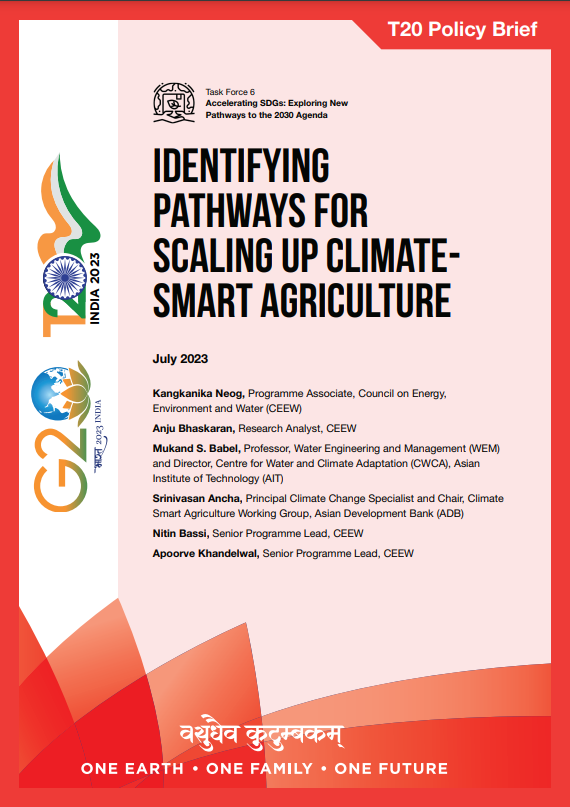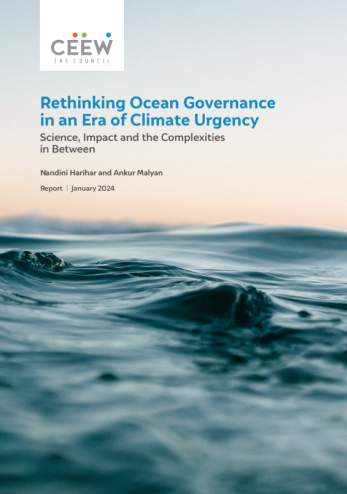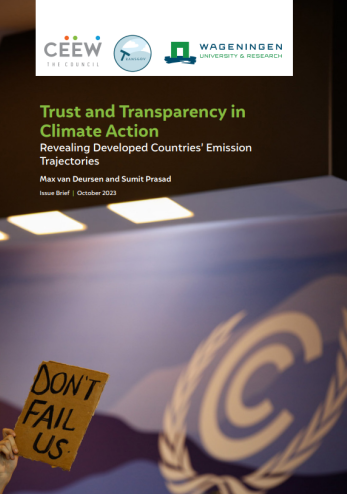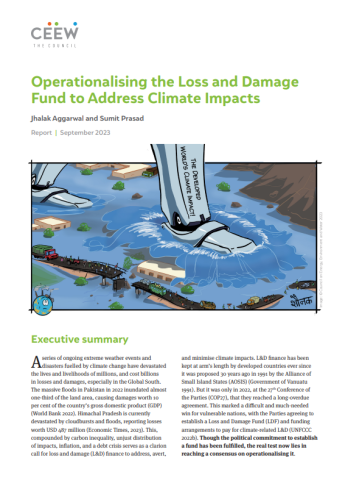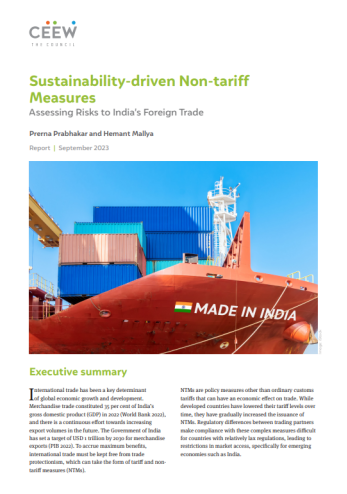Policy Brief
Identifying Pathways for Scaling Up Climate-Smart Agriculture
Kangkanika Neog, Anju Bhaskaran, Mukand S. Babel, Srinivasan Ancha, Nitin Bassi and Apoorve Khandelwal
July 2023 | International Cooperation, Sustainable Food Systems
Suggested citation: Neog, Kangkanika, Anju Bhaskaran, Mukand S. Babel, Srinivasan Ancha, Nitin Bassi, Apoorve Khandelwal. 2023. Identifying Pathways for Scaling Up Climate-Smart Agriculture. T20 Policy Brief.
Overview
This paper, published by the T20 India Task Force on Accelerating SDGs: Exploring New Pathways to the 2030 Agenda, discusses pathways to scale up climate-smart agriculture (CSA). CSA is an evolving concept at the centre of global food security, climate action, and disaster risk reduction. It provides an encompassing framework to address mitigation, adaptation, and productivity challenges. This policy brief recommends a pathway that the G20 leaders and other intergovernmental collaborations could lead to accelerate CSA adoption: Existing multi-stakeholder platforms can be strengthened for collaboration, knowledge sharing, and information exchange; an enabling environment for deploying CSA should be created; and the planning, adoption, and implementation of monitoring, evaluation, and learning (MEL) processes for CSA should be accelerated.
Key Highlights
- An estimated 22 per cent of global greenhouse gas emissions in 2019 were from the agriculture, forestry, and other land use sectors. Moreover, adverse impacts of climate change on agricultural productivity—including those of increased frequency and intensity of extreme weather events such as floods and droughts—have diminished food and water security, thereby creating a massive challenge to meet the SDGs.
- CSA presents an encompassing framework that attempts to improve productivity while addressing mitigation and adaptation in the sector.
- Advancing CSA needs a holistic approach: broaden scope, consider value chain, address governance challenges (policy-practice gap, participatory approach, small-scale producers, political economy), and establish pre-defined MEL processes.
- Although there is a substantial increase in global collaborations on efforts to improve food security, there is also fragmentation in the agriculture sector on approach, framing and terminologies. Therefore, while developing solutions that are critical for food security, there is a need for 'true' collaboration in the sector across the interest groups following the myriad different but related approaches, framing and terminologies.
Recommendations
- Strengthen multi-stakeholder platforms (MSPs) for collaboration, knowledge sharing, and information exchange. The G20 should lead the alignment of the numerous stakeholders employing different approaches to improve agriculture under climate change and variability and encourage collaboration in the common aspects.
- Create an enabling environment for deploying CSA that are context-specific and targeted. To strengthen CSA, enhance data and research capabilities, build institutional capacity, drive finance and investments aligning with the Matera Declaration, prioritise capacity development, and promote innovation and technology transfer for scaling up leveraging G20 capabilities.
- Accelerate planning, adoption and implementation of MEL processes for CSA at all scales. First, develop and drive CSA programmes and project-level monitoring and evaluation using indicators and taxonomy that is universal and therefore, comparable. Second, facilitate institutional readiness to support reporting at all scales that can be culminated in the national Enhanced Transparency Framework (ETF).
"Although there is a substantial increase in global collaborations on efforts to improve food security, there is also fragmentation in the agriculture sector on approach, framing and terminologies"




